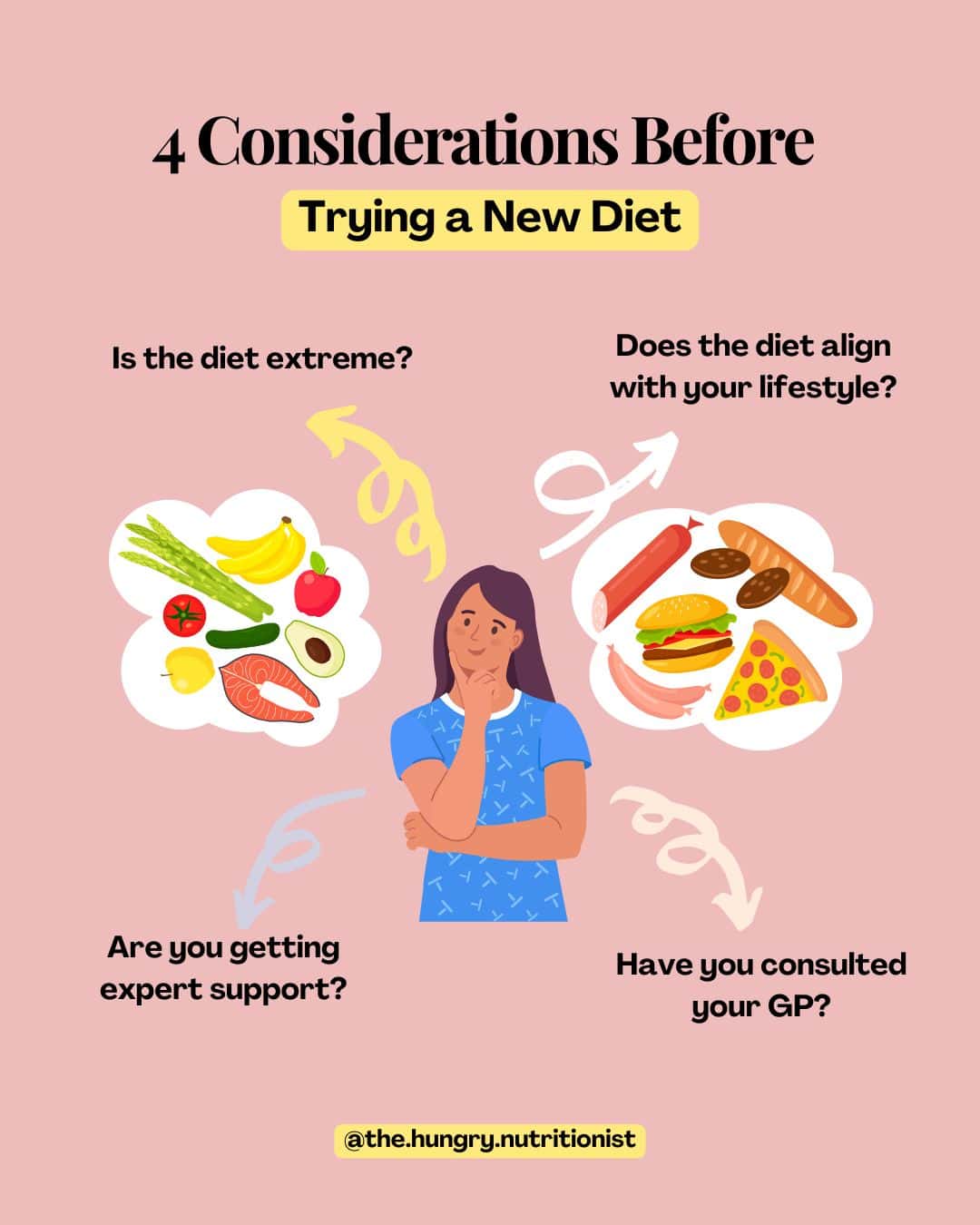Last Updated on: 25th October 2024, 02:37 pm
This article was written by Associate Registered Nutritionist (ANutr) Cherie Ko, and reviewed by Registered Dietitian, Sarah Idakwo
In recent years, the carnivore diet has gained significant attention as a radical approach to eating that focuses exclusively on animal products. It has been claimed that the carnivore diet can lead to weight loss, improved mental clarity, and even the reversal of chronic diseases.
However, it’s essential to examine both the potential benefits and the serious risks associated with such an extreme dietary regimen. In this blog, we’ll dive into what the carnivore diet entails, why it may be problematic for your health, the current scientific evidence on its effects, and key considerations before trying any new diet trend.

What is the carnivore diet?
The carnivore diet is a form of a ketogenic diet, that is centred exclusively on animal products like meat, fish, eggs and small amounts of low-lactose dairy foods, while all fruits, vegetables, nuts, grains, and legumes are strictly off the menu. Advocates also encourage the inclusion of fattier cuts of meat to ensure daily energy needs are met.
The core philosophy behind the diet is rooted in the belief that human bodies are optimised for consuming animal-based foods, which are rich in proteins, fats, and essential nutrients. It is argued that this diet mimics what our ancestors ate and can lead to better health and vitality.
Why is it problematic?
Nutrition
The most significant concern with the carnivore diet is its complete exclusion of carbohydrates, one of the main food groups essential to a balanced diet. Carbohydrates are the body’s primary source of energy, and eliminating them entirely can have serious repercussions on overall health.
Additionally, the carnivore diet’s prohibition of fruits and vegetables could lead to a lack of dietary fibre, which plays a crucial role in maintaining a healthy gut microbiome, to maintain regular bowel movements and to support digestive health (1).
Another significant concern is the potential for nutritional deficiencies. Fruits and vegetables are rich sources of essential vitamins and antioxidants, such as Vitamin C and A, which are vital for immune function, skin health, and overall well-being. Long-term adherence to the carnivore diet could result in nutritional deficiencies, which could have serious health implications.
Mental Health
Extreme diets, such as the carnivore diet, could have significant impacts on mental health, potentially leading to or exacerbating disordered eating patterns or eating disorders.
The carnivore diet’s strict elimination of entire food groups can create a sense of deprivation, which could contribute to obsessive thoughts about food, guilt, and even binge-eating episodes when the restrictions are broken.
For individuals with a history of disordered eating, the carnivore diet’s extreme nature can trigger unhealthy eating patterns, such as labelling food as “good” or “bad”. Similarly it can also encourage Orthorexia, where any deviation from the diet is seen as a moral failing or health risk.
Overall Health
Being on the carnivore diet could mean having a high intake of saturated fats and cholesterol, and also an increased consumption of red and processed meats. There are concerns such a dietary choice could increase the risk of cardiovascular diseases such as heart disease, stroke, and hypertension, as well as certain cancers (2).

What Does the Current Evidence Say?
As of now, there is no robust scientific evidence to support the health benefits of the carnivore diet. A small handful of studies have shown that being on a high-protein or low carbohydrate diet, showed greater weight loss than their counterparts who followed a low-fat or standard diet. These studies however were done with a very small number of participants and conducted over a short time frame (3, 4).
While some studies have explored the impact of individual food components on health, these studies have not examined the effects of consuming only animal-based foods. For instance, research has shown that substituting carbohydrates for fish, lean animal protein or plant-based proteins can lead to decreased mortality risk. Nevertheless these findings do not support the idea that a diet consisting solely of animal products would result in better health outcomes (5).
Furthermore, these studies do not account for the effects of the carnivore diet on cardiovascular disease risk, as they do not fully evaluate how such an extreme diet impacts biomarkers like lipids, apolipoproteins, and blood pressure (6).
What Should You Consider Before Trying a New Diet?
In today’s world, new diets seem to appear on social media every week, each promising miraculous results—from rapid weight loss to curing chronic illnesses. However, it’s crucial to approach these diets with caution.
Here are somethings to consider before starting a new diet:
- Is the diet recommending something extreme?
If a diet asks you to eliminate entire food groups or drastically reduce your calorie intake for extended periods, it could be dangerous. Long-term adherence to such diets can lead to nutritional deficiencies and other health issues.
- Does the diet align with your personal preferences and lifestyle?
Strict diets can make social dining challenging and may require significant changes in food preparation, which might not be sustainable in the long run. Many social activities revolve around food, and being on a diet that is highly restrictive could impact your social life, but also impact your relationship with food.
- Are you getting expert support?
Extreme diets can lead to significant changes in your body, and without proper guidance, you risk serious health issues. Be sure to consult a registered dietitian or nutritionist before you start a new diet.
- Have you consulted your doctor?
Certain diets may not be safe for everyone, particularly those with chronic diseases, pregnant or breastfeeding women, and children. Always check with your GP or healthcare provider before starting a new diet.

Conclusion
While the carnivore diet may appeal to those looking for a quick fix or a radical approach to health, it’s essential to weigh the potential risks and the long term sustainability of the diet. Before jumping on the latest dietary trend, make sure to take the time to consult with healthcare professionals and consider whether the diet aligns with your health goals and lifestyle.
If you need additional support when deciding on whether you should start a new diet, book a call with our team here.


